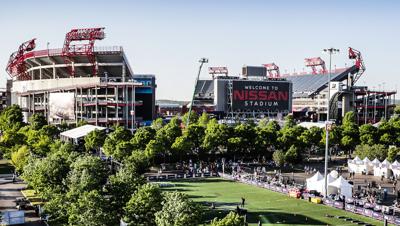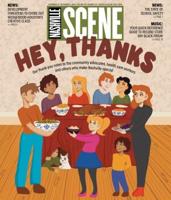Jim Gingrich, former COO of AllianceBernstein, made a splash this week with a lengthy analysis of John Cooper’s handling — mishandling, according to Gingrich — of the Titans stadium deal.
Gingrich has a seat in many of the city’s top business circles, like the Nashville Area Chamber of Commerce and Nashville Convention & Visitors Corp, having worked his way into the city’s social-political scene in the few short years since the New York asset manager moved to Nashville. Gingrich left AB in August to manage his own assets and eye a run for mayor. It’s the latest in a series of shots by mayoral challengers trying to separate themselves from the flock.
The letter, which went out to councilmembers before their July 5 meeting, cited an “apparent lack of stewardship in this important negotiation” — a direct shot at the mayor, who has been handling negotiations largely behind closed doors. Gingrich warns that the Titans are fleecing the city and a new stadium equates to a multibillion-dollar transfer of wealth from taxpayers to the professional football franchise. New digs would be a boon for one of the NFL’s least valuable franchises owned by some of the league’s poorest billionaires, the Adams-Strunk family. New avenues for revenue, like stadium naming rights and sponsorship deals, would quickly return and possibly exceed the Adams-Strunks’ $700 million investment. A new stadium would void personal seat licenses (PSLs), the flat fee for season ticketholders, allowing owners to sell new PSLs at higher prices.

The city would be on the hook for an estimated $1.2 billion plus another $1 billion in East Bank upgrades — about $3,000 per resident, according to Gingrich. Public investments in stadiums are historically bad deals for taxpayers — the type of boondoggles that are routinely dunked on by economists.
The mayor’s office is keeping tabs on challengers, dismissing Gingrich’s email as politically motivated sleight-of-hand. Says communications director TJ Ducklo: “Setting aside the transparent political theater by a recent Nashvillian, the muddled critique fails to consider the most important fact facing the city: The current lease signed in the late 1990s leaves taxpayers on the hook for hundreds of millions of tax dollars for stadium maintenance.”
Cooper hasn’t officially announced a reelection bid, but his campaign account has started taking money from lobbyists aligned with the Titans, big business and the East Bank. A $5,000-a-head fundraiser on June 28 attracted local figures like Sam Reed, Greg Hinote, James Weaver and Beecher Frasier. Cooper self-financed his 2019 mayoral bid; last month's event raised more than $300,000, which may go toward paying down the $725,000 in loans owed by the Cooper campaign to Cooper the individual.
The letter rankled some members of the business and tourism community, who have been publicly and privately pushing the stadium conversation forward since February. Along with the NCVC, Gingrich co-signed a Tennessean opinion piece in April that pointed out all the benefits of a new stadium, leaving critics to characterize Gingrich’s pivot as an attempt to score political points.
“The two pieces are very consistent," Gingrich tells the Scene. "The Titans are an integral part of what makes Nashville such a vibrant and great city, and the team deserves the city’s partnership. I am not against a new stadium; I am opposed to a one-sided deal that shortchanges taxpayers and Titans fans.”
Regarding their alleged fleecing, Kate Guerra, the Titans’ VP of marketing and communications, says any financial speculation is premature. “We don’t even know the seating capacity of a new stadium," Guerra tells the Scene. “We don’t have a financial model yet. We don’t even have a deal with the city yet.”
Even if the team hasn’t modeled the exact implications of its $700 million outlay — a major financial move for a multibillion-dollar company — new stadiums typically accompany dramatic increases in franchise value.
The Titans have seven more seasons under the current lease and the unilateral option to extend their stay in Nissan Stadium until 2039. While the city tries to cobble together multiple streams of tax revenue to back billions of dollars in bonds, sources close to negotiations speculate that the Metro Council will see a more concrete deal sometime in the fall.





